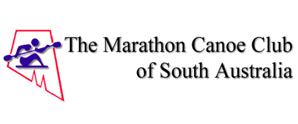
Kanoe4Kids team cross Lake Alexandrina
Scott Mathews has now completed his paddle of entire length of the Murray River. He has done his as a fundraiser for the “Make a Wish” foundation. The last 980km was paddled with his good friend Steve Patterson.
(For more info see www.kanoe4kids.com.au/ )
As is often the problem with a ÒLength of the Murray paddleÓ the timing of the Kanoe 4 Kids Lake crossing was determined by media commitments at the Goolwa end. As these commitments were programmed for Tuesday the 9th of December it meant the Lake crossing had to be managed sometime over the Sunday evening Ð Monday evening window.
The forecast for Monday afternoon was not pleasant with a 15Kn wind from the South West. However the Sunday night and early Monday morning was forecast to be calm with 8Kn Southerlies turning 5Kn from the North East.
Brad Butler had offered to accompany the boys across Lake Alexandrina and was thankful to co-op friend and paddling partner Emily Rozee.
After much discussion with the Bureau of Meteorology and following confirmation of the Kanoe 4 Kids team it was decided that a night paddle would provide the best chance of a successful crossing.
Launching at 10.30pm on Sunday night Brad and Emily joined with Scott and Steve paddling out of the Welington Marina, past the punt and on toward Brinkley, Jokwar and eventually Point Pomanda. Conditions were good with clear skies, a bright moon and just a light breeze from the South keeping conditions cool but not being strong enough to cause concern.
Using the light on the Wellington Lodge water tank as a guide the paddlers edged their way slowly toward Point Pomanda. Brad and Emily had to discipline themselves not to pull away from the single kayaks but were honestly engaged in idle chat and viewing the amazing bird life and beautiful stars.
After passing Brinkley homestead the paddlers moved West toward the right hand only to find that very shallow water hampered their progress. Within sight of Pomanda the winds picked up and after turning due West the Southerly breeze began to push wind driven chop on to the decks of the kayaks.
Pulling it at Pomanda at 1am it was decided to avoid a crossing and grab some shut eye before re-evaluating the decision closer to morning. And so dressed in wet thermals and with only one bivvy bag between 4 paddlers the team crawled into their sleeping bags on the grassy bank to grab what sleep they could. Everyone fell asleep to the sound of the waves hitting the south facing shore of Pomanda Point.
Waking at 4am Brad was amazed to hear very little wave action and quickly roused everyone with a ÒWho wants to paddle?Ó Given the choice of interrupted sleep in cold, wet sleeping bags or no sleep paddling in the cold and wet everyone took the former option.
A mouthful of breakfast and a cup of warm coffee from a pre-prepared thermos put together by Renee gave everyone a quick jolt and at 4.30am all 4 paddlers hit the water.
Taking a direct line slightly north of the central flashing beacon in the middle of the Lake the paddlers made good time in their fatigued state. The sun rose shortly after 5.30am and everyone could now pick up the various land marks of the Lower Lakes, Poltaloch, Strathalbyn, Point Malcolm, Mount Barker, Narrung and Raukan. Then just as Pomanda disappeared in the east Point Sturt popped up on the horizon.
A quick chat was had with a couple of fisherman in the middle of the Lake before reaching the very tip of Point Sturt, a quick walk, a stretch and some lovely fruit cake. It was cold in the now easterly wind on the Point and so kayaks were walked back out into deep water. The easterly waves and wind assisted the paddlers reach Clayton ahead of schedule at 10.45am in a slightly sleep deprived state but in good humour.
On Lake levels Ð well the yes the lower Lakes are very low but they navigable. You can intellectually visualise the sad state that must require the pumping of water into Lake Albert but the highlight of the crossing for Brad and Emily was the abundant bird life and in particular the hundreds of birds congregating in groups to sleep at night. A reminder that Mother Nature persists through adversity despite the apparent lack of care exhibited by human interference and development.


